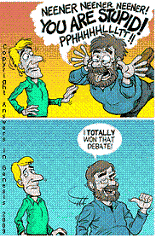Dreadful events in Paris yesterday. Amidst ongoing dreadful events in the Middle East, of course. Not to forget an ongoing list of dreadful events perpetrated by anti-creation Islamists over the years. Much of the coverage today is about the need to show fortitude in the midst of attacks on the civilized values of democracy, diversity, tolerance and freedom of speech.
Yet to me there’s a strange lack of clarity about what actually constitutes these values that are held so sacred. In some comments, they seem to entail the preservation of people’s freedom to criticise as they like, even if what they say is abhorrent. In others, though, journalists are saying that it is in the tradition in western countries to mock others, and that this tradition of mockery is the value to be defended under attack. But those two – freedom to criticize and right to mock – are not the same thing at all.
I s uggest that “criticism” and “mockery” ought not to be conflated, even though like Wisdom and the Adulteress in the Book of Proverbs they dwell close by each other. This (all too rare) cartoon criticizes the practice of mockery, which would be quite distinguishable from one mocking the practice of criticism. It’s certainly clear that the Islamists have no interest in the difference. But actually, the best tradition of civilized societies has always been to encourage criticism as a worthy value, and to tolerate mockery as a necessary evil, not to laud it as a good in itself:
uggest that “criticism” and “mockery” ought not to be conflated, even though like Wisdom and the Adulteress in the Book of Proverbs they dwell close by each other. This (all too rare) cartoon criticizes the practice of mockery, which would be quite distinguishable from one mocking the practice of criticism. It’s certainly clear that the Islamists have no interest in the difference. But actually, the best tradition of civilized societies has always been to encourage criticism as a worthy value, and to tolerate mockery as a necessary evil, not to laud it as a good in itself:
Only a small mind traffics in scorn; a mind whose truth accords no place to others’. But we who knew that different truths can coexist thought not that we were lowering ourselves by countenancing another’s truth, unpalatable though it might seem. – Antoine de Saint-Exupery
What seems to be largely unnoticed in today’s press is the degree to which western thought has set aside the virtue of criticism (which at a societal level is actually mainly self-criticism), assumed the truth of its own prejudices as axiomatic, and mocked whatever does not conform. Practically, that plays into the hands of violent people who, resistant to criticism, are obnoxious to mockery. But seen morally, the west is not opposing civilized values against barbarity at all, but simply setting one unconsidered set of beliefs against another unconsidered set of beliefs through the use of scorn. What in that is worth defending?
William Paley famously said of Edward Gibbons’ snide critique of Christianity, “Who can refute a sneer?” Being a man of Christian, and western, values, he tried to do so anyway using reasoned argument. Mocking in return would have been merely pathetic. But an alternative is to attack the mocker physically. Evil people can, of course, also respond violently to reasoned criticism, but in that case the arguments remain unrefuted, and their cause is bound to fail.
Gerard Biard, Charlie Hebdo’s editor-in-chief, who was in London at the time of the attack, said: “I don’t understand how people can attack a newspaper with heavy weapons. A newspaper is not a weapon of war.” We must make allowances for his shock and grief, but quite clearly newspapers are weapons of war, and always have been. The Times was nicknamed The Thunderer because it thundered for social and political reform. Pravda was initiated to redefine Truth in Bolshevik terms and so to destroy its enemies.
The question is for what ideology newspapers are fighting. Because the plain fact is that, in the business of mockery, the playing field is far from level. Charlie Hebdo defends its mockery of Mohammad by saying it also mocks other religions. But does it, I wonder, also mock irreligion? In terms of principle, does it mock what it believes in as much as it mocks what others believe? Beyond that one publication, across the western press, are all institutions equally scorned, if indeed “mockery” is held to be the western value to preserve? If not, the real “western values” are nothing to do with freedom at all, but the maintenance of the particular “authorised” set of beliefs of those controlling the press. Rather the opposite of democracy, diversity, tolerance and freedom of speech, wouldn’t you say?

I’ve started to wonder if “what you think your god wants you to do” isn’t a better guide to who you’re really worshipping than what name you call him. It’s an extraordinary thing that people can commit the most extreme atrocities possible, do it in their god’s name and never notice that their behavior is indistinguishable from what would be expected of a devil worshipper.
pngarrison
The human ability to do evil and think it good is the story of our race, n’est-ce pas?
Thank God it isn’t the whole story.
“Men never do evil so completely and cheerfully as when they do it from religious conviction.”
Pascal comes through again.
I agree with the statement, but was Pascal the first person to make the observation?
Probably not, but who knows? It would take someone like Lewis who had read nearly everything ancient and medieval to know. It might have required the incipient Enlightenment perspective of daring to stand back and compare religion to atheism to realize that religion can sometimes facilitate evil. (Of course the perspective of the gospels on the Pharisees was there before.) Maybe Jesus was the first to point it out.